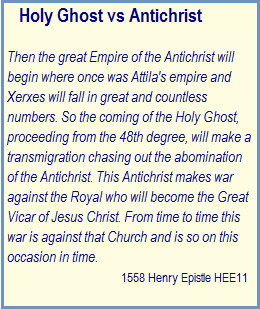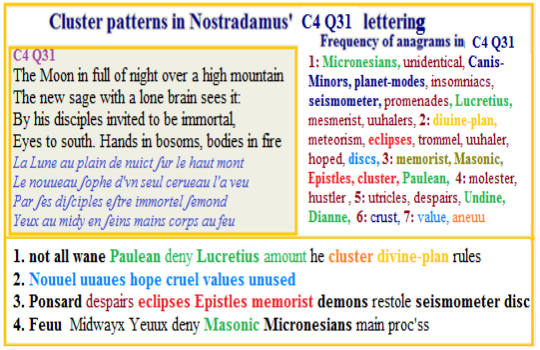 Analyses of all verses
Analyses of all verses
|
 Web Site
Web Site |
 All
Sefirots All
Sefirots |
Nostradamus C4 Q31: Lucretius,
Luther, Masons & Pauleans underpin his sects values
Copyright: Allan Webber, December 2015, 2022

 The
text of this verse has a distinct tone of personal relevance to
Nostradamus. It reeks of secrecy, dedication and the pursuit of a higher
purpose.
The
text of this verse has a distinct tone of personal relevance to
Nostradamus. It reeks of secrecy, dedication and the pursuit of a higher
purpose.
But this goes deeper because beneath its lettering are terms uniquely tying it to to the series on the Polar Axis shift and the quote in his 1558 Epistle that relates to that type of event.
In the lettering of the second line alone there are terms such as Epistles, Eclipses and seismometer. These features stamp C4 Q31 as a special verse meant to tie his prophecies to the guideline in his Epistle shown alongside.
There is also a verse whose text talks of an event producing the type of effects to be expected during a large polar axis shift that has anagrams in it for Nostradamus' name.
 Its
presence suggests Nostradamus secretly included himself as the author of
the material in that verse (C2 Q86) and because of the shared heritage
it too has with the quote I present them as a paired unit as shown in
the Axis Shift verse list at top right.
Its
presence suggests Nostradamus secretly included himself as the author of
the material in that verse (C2 Q86) and because of the shared heritage
it too has with the quote I present them as a paired unit as shown in
the Axis Shift verse list at top right.
In this verse there are also other anagrams that burgeon in the juices of the text.
There are many names whose presence also hints this verse is not only personal it is about Nostradamus' sect and its values.
There is a list of names and concepts which outline a value system that if known in the sixteenth century would have put Nostradamus' life in danger.
Foremost amongst the names and concepts included as anagrams are Lucretius (uict ſur le), Paulean (ne au pla), Masonic (mains co), Luther's (t ſur le h), Undine (n de nui) and Dianne (ain de n). Together these define a reference system that is strong on rational pragmatism and non-conformist Christian values. It also identifies people of Nostradamus' time such as his wife with whom he had allegiance even if this was limited to their ideas, ideals or some part thereof.
Extra Info:
Titus Lucretius Carus (was a 12thC BCE Roman poet and philosopher. His only known work is the epic philosophical poem De rerum natura about the tenets and philosophy of Epicureanism, and which is usually translated into English as On the Nature of Things.....it played an important role both in the development of atomism and the efforts of various figures of the Enlightenment era to construct a new Christian humanism.
Epicurus 341-270 BC) was an ancient Greek philosopher as well as the founder of the school of philosophy called Epicureanism....
For Epicurus, the purpose of philosophy was to attain the happy, tranquil life, characterized by ataraxia (peace and freedom from fear) and aponia (the absence of pain) and by living a self-sufficient life surrounded by friends.
He taught that pleasure and pain are the measures of what is good and evil; death is the end of both body and soul and should therefore not be feared; the gods neither reward nor punish humans; the universe is infinite and eternal; and events in the world are ultimately based on the motions and interactions of atoms moving in empty space.
Undines or ondines are a category of elemental beings associated with water, first named in the alchemical writings of Paracelsus. Similar creatures are found in classical literature, particularly Ovid's Metamorphoses.....
Although resembling humans in form they lack a human soul, so to achieve immortality they must acquire one by marrying a human. Such a union is not without risk for the man, because if he is unfaithful he is fated to die.
Lutheran values: As central to their mission and ministry, Lutheran schools seek to nurture individuals, who are aware of their humanity, open to the influence of the Holy Spirit, and growing in and living according to a cohesive worldview... while living in community and reflecting characteristics of God through core values, especially love, justice, compassion, forgiveness, service, humility, courage, hope, quality and appreciation.
Masonic Values: Masons believe in the importance of religion; men of all faiths are welcome as members of the organization. Freemasonry celebrates ethnic diversity and welcomes men of all racial backgrounds.
Ethics: Masons practice a lifestyle
based on honor, integrity, and philanthropic values. We believe there's
more to life than pleasure and money.
Tolerance: The
fraternity transcends religious, ethnic, cultural, social, and
educational differences. We respect others' opinions and strive to grow
and develop as human beings.
Philanthropy: Masons are
committed to making a difference in our world through community service,
volunteerism, andcharity.
Family:Strong family
relationships are important, and Masons aim to include their families in
many of their activities.